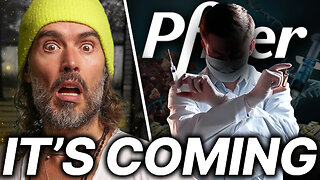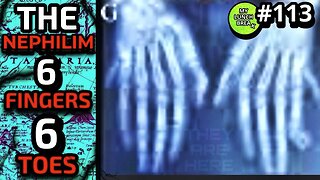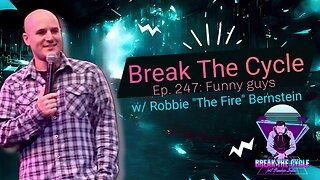Premium Only Content

Episode 2703: Would Christ Have Come if Man had not Sinned?
Time is getting close to “Word Made Flesh” I’ll put the registration link in the show notes.
https://forms.gle/tuzqrhTXTZQuf7VH9
If you can’t make it in person you can join via zoom. Please attend. I promise it will help you focus during the Advent season and make Christ the reason for the Season.
Would the Word have been Made Flesh had man not sinned? Well, before I answer that question, I want to first ask the question as to the reason God made the world and its final end. The quick answer to that question is the creation was entirely oriented toward His glory and the sharing of His divine love. This purpose is beautifully encapsulated in St. Thomas Aquinas' Summa Theologiae and echoed by many saints and theologians throughout Church history.
The Reason God Made the World
God created the world ex nihilo (out of nothing) not out of necessity but out of sheer love and goodness. St. Thomas Aquinas explains that God is pure act, infinite in goodness, and thus willed to communicate His goodness by creating beings who could share in His beatitude (Summa Theologiae, I, q. 44, a. 4). This act of creation is entirely gratuitous, stemming from God’s desire to glorify Himself in and through His creatures, as the Catechism of the Council of Trent explains:
"God created the world to manifest His glory and to communicate His perfections."
This glory is not something God lacks or needs, but it is the revelation of His majesty to creatures, who are then drawn to know, love, and serve Him.
The Final End of the World
The ultimate purpose, or telos, of creation is the glorification of God, particularly in rational creatures humans and angels who can know Him and freely respond in love. St. Ignatius of Loyola summarizes this truth succinctly in the first principle of his Spiritual Exercises:
"Man is created to praise, reverence, and serve God our Lord, and by this means to save his soul."
St. Augustine, in his Confessions, beautifully reflects on the human heart's restless longing for God:
"You have made us for Yourself, O Lord, and our hearts are restless until they rest in You."
The end of the world, therefore, is the consummation of all things in Christ, when God will be "all in all" (1 Corinthians 15:28). At the Last Judgment, creation will be restored and glorified, and those who have loved and obeyed God will enjoy the Beatific Vision seeing God face to face in eternal union (Revelation 22:4).
The Saints' Perspective on Creation's End
St. Francis of Assisi emphasizes creation's role in glorifying God in his Canticle of the Sun, where he praises God through the beauty of nature. This highlights that all creation is a reflection of God's goodness.
St. Bonaventure writes in his Breviloquium that the final end of man and all creation is the "return to God," who is both the Alpha and the Omega.
St. Maximilian Kolbe, with his profound Marian devotion, teaches that creation culminates in union with God through the Immaculate Virgin Mary, who perfectly reflects God’s glory and leads souls to Christ.
Conclusion
God created the world out of love, to manifest His glory and to share His divine life with His creatures. The final end of all creation is the glorification of God and the eternal happiness of rational creatures in the Beatific Vision, where they will participate in the infinite love and life of the Most Holy Trinity. As the Baltimore Catechism beautifully puts it:
"God made us to know Him, to love Him, and to serve Him in this world, and to be happy with Him forever in the next."
Now lets ask another question. Why did God create the world and man when he already had the 9 choirs of Angels? So deeply rooted in theology and the writings of the saints, explains that God created man and the world even though He already had the nine choirs of angels not out of necessity or deficiency, but out of His infinite goodness, love, and desire to share His glory in manifold ways.
The Purpose of Creation in Light of the Angels
God, being infinite, is not limited in His creative power. While the angels were created as pure spirits to know, love, and serve Him, their existence does not exhaust the ways God can manifest His glory. The creation of man and the material world reveals aspects of God's nature that spiritual beings alone cannot fully reflect. St. Thomas Aquinas, in his Summa Theologiae (I, q. 47, a. 1), explains:
"The perfection of the universe requires a diversity of creatures."
In other words, God created the material world and mankind to reflect His glory in a way distinct from the purely spiritual nature of the angels. By combining body and soul, humanity uniquely unites the spiritual and material realms, demonstrating God's wisdom and power to create beings that participate in both.
Reasons for Creating Humanity and the Material World
To Manifest His Infinite Goodness:
God’s goodness is infinite, and He desired to communicate it more abundantly. While the angels reflect His spiritual beauty and intellect, humanity reflects His creative power and love through the unity of body and soul, free will, and the capacity for relationships.
St. Bonaventure writes in his Breviloquium:
"God, in His supreme goodness, willed that His eternal goodness be shared in a multiplicity of ways."
To Share in His Love Freely:
Humanity, created in God’s image and likeness (Genesis 1:27), possesses free will. Unlike the angels, who made a definitive choice for or against God, humanity participates in salvation history within time, allowing God’s mercy, justice, and love to be revealed through Christ’s Incarnation, Passion, and Resurrection.
To Manifest Christ as the Center of Creation:
The creation of the material world and humanity points to the ultimate purpose of all creation: Christ. St. Paul writes in Colossians 1:16:
"For in Him were created all things in heaven and on earth, visible and invisible... all things were created through Him and for Him."
The Incarnation of Christ, the union of divine and human nature, brings creation to its fulfillment. The angels, though already created, could not reflect the mystery of the Incarnation as humanity does.
To Glorify God Through Redemption:
The Fall of man, foreseen by God, allowed for the even greater manifestation of His love and mercy through the Redemption. St. Augustine, in his Enchiridion, expresses the Church's teaching:
"God judged it better to bring good out of evil than not to permit any evil to exist."
This divine plan reveals aspects of God’s glory mercy, forgiveness, and sacrificial love that could not be fully displayed through the angels alone.
The Angels' Role in the Creation of Man
Far from rendering the creation of man unnecessary, the angels' existence complements humanity’s role in glorifying God. The angels serve as protectors, messengers, and ministers of God’s plan for humanity (Hebrews 1:14). They rejoice in God’s works and glorify Him more fully through their service to His material creation, as seen in Luke 15:10, where the angels celebrate the repentance of sinners.
Conclusion
God created man and the world not because He needed more creatures, but because His infinite love desired to manifest His glory in diverse ways. Humanity, with its unique capacity to unite the material and spiritual, freely love God, and participate in Christ’s salvific plan, complements the angelic choirs. Together, angels and humanity reflect the fullness of God’s glory, revealing His boundless goodness and the beauty of His divine plan.
The Thomistic Perspective: Christ as Redeemer from Sin
A good place to start is with the theology of St. Thomas Aquinas. In the Summa Theologica, Aquinas argues that the Incarnation was primarily meant to restore humanity from sin. He writes:
“The work of the Incarnation was ordained by God as a remedy for sin; so that, if sin had not existed, the Incarnation would not have been necessary.”
In this view, the Incarnation is seen as God's answer to the Fall of Adam and Eve. However, Aquinas adds that even without sin, God could still have become man, not out of necessity, but because of His love and wisdom:
“God's power is not limited to this, that He should only be able to restore what was corrupted by sin.”
So, while Aquinas leans towards the idea that the Incarnation is primarily for Redemption, he leaves open the possibility that Christ could still have come even if Adam and Eve had not fallen. It reminds us that God’s plan isn’t just about fixing sin it’s about revealing His glory and drawing us into communion with Him. I bet you would never have thought about it that way because we always view Christs incarnation as the result of original sin because that is what happened.
The Franciscan Thesis: God’s Eternal Plan of Love
Now, let’s turn to a different perspective: the “Franciscan Thesis,” championed by Blessed John Duns Scotus. Scotus argues that the Incarnation was always part of God’s plan, regardless of whether Original Sin occurred. As he wrote:
“The Incarnation of Christ was not occasioned by sin but was intended from the beginning as the crowning glory of creation.”
According to Scotus, Christ would have come as the perfect expression of God’s love and union with creation. This view highlights that God’s purpose for the Incarnation is rooted not only in mercy but also in divine love an outpouring that isn’t dependent on human failure.
Pope John Paul II seemed to echo this idea when he reflected on the Incarnation. In a general audience in 1985, he said:
“The mystery of the Incarnation is the supreme revelation of God's love, a love that would not have been withheld, even if there had been no sin.”
This reflects the heart of the Franciscan thesis: God’s love is not reactive but proactive. Even if sin had never entered the world, the Incarnation could still have been God’s chosen way to unite Himself with humanity.
The Role of Mary in God’s Eternal Plan
What about the Blessed Virgin Mary? Would she still have been chosen as the Mother of God if sin had not entered the world? St. Louis de Montfort believed that Mary was part of God’s eternal plan from the beginning, not just a response to the Fall. He writes:
“From all eternity, even before the Fall, God chose the Blessed Virgin Mary to be the Mother of His Son.” (True Devotion to Mary, §18)
The Church teaches that Mary was preserved from Original Sin through her Immaculate Conception, as Pope Pius IX declared in Ineffabilis Deus:
“She was preserved free from all stain of Original Sin from the first moment of her conception by a singular grace and privilege of Almighty God.”
Whether or not Christ’s mission was focused on redemption from sin, Mary’s role as the Theotokos (God-bearer remains central to God’s plan).
Trusting in God’s Providence
The debate between Aquinas and Scotus reminds us that the mystery of God’s plan is beyond our full understanding. Both perspectives reflect God’s providence: one emphasizes His mercy in the face of sin, and the other highlights His eternal love that surpasses all conditions. As St. Paul wrote in his letter to the Ephesians:
“He chose us in Him, before the foundation of the world, to be holy and without blemish before Him in love.” (Ephesians 1:4)
This passage shows that God’s plan for us is not just about redemption it’s about love and holiness. Whether or not sin entered the world, God’s ultimate goal remains the same: to draw us into union with Him through Christ.
Practical Takeaway: Living in the Mystery of God’s Love
So, what does all of this mean for us today? Regardless of whether Christ came to save us from sin or simply as an act of divine love, the Incarnation is an invitation to participate in God’s life. As Pope Benedict XVI beautifully said:
“God is love, and His love calls us to share in His very life.” (Deus Caritas Est, 1)
And through the sacraments, especially the Eucharist, we continue to encounter the Incarnate Christ. St. Augustine once said:
“God became man so that man might become God.”
This doesn’t mean we become divine by nature, but that through Christ, we are raised to share in the divine life by grace.
God’s Original Plan: A World Without Sin
Now lets get a little creative. Let’s start with the world as God intended it. Before Adam and Eve’s disobedience, humanity was created in a state of original justice. The Catechism explains that this state meant man was in perfect harmony with God, with each other, and with creation itself. As paragraph 376 of the Catechism of the Catholic Church states:
“As long as he remained in the divine intimacy, man would not have to suffer or die.”
Imagine it no sickness, no war, no suffering. Human intellect and will were perfectly aligned with God’s, and there was no disorder within the soul. Every action, every thought, and every choice would have reflected God’s wisdom and love.
It’s hard to imagine, isn’t it? A world without temptation, without brokenness, without the struggle to do good. St. Thomas Aquinas described this pre-Fall state as a world where the lower passions like hunger, anger, and fear were perfectly governed by reason, and reason was entirely subject to God’s law. Human beings wouldn’t need to struggle against sin because no inclination toward sin existed.
What Would the Incarnation Have Looked Like?
Here’s where things get really interesting. If Adam and Eve hadn’t fallen, would Christ have still become incarnate? Many saints and theologians, especially in the Franciscan tradition, argue that He would have but not as a Savior. Instead, His coming would have been the crowning moment of creation.
Blessed John Duns Scotus taught that Christ was always meant to come as the perfect union of God and man. He writes:
“The Incarnation was not first intended as a remedy for sin, but as the fulfillment of God’s desire to unite Himself with His creation.”
Christ would not have come to suffer and die but to reign in glory as the head of a perfected human race. Imagine a world where Christ’s kingship was established without pain or suffering, with every man and woman participating in that divine life from the very beginning. This would have been a world marked by peace, joy, and unbroken communion with God.
The Role of Mary in a Sinless World
Even in a world without the Fall, the Blessed Virgin Mary would still have been chosen as the Mother of God. St. Louis de Montfort tells us that God willed Mary from all eternity as the masterpiece of His creation, saying:
“God, in creating the world, had in mind only the Incarnation and the Virgin Mother.” (True Devotion to Mary, §18)
However, in this sinless world, Mary’s role would not have been one of suffering or sorrow. She would have been a queenly figure, bringing Christ into the world not as a suffering servant, but as a glorious King, reigning with her Son over a perfected creation.
And because there would have been no need for Redemption, Mary’s sorrows her Seven Dolors would never have occurred. Instead, her life would have been one of uninterrupted joy, a life fully immersed in the divine will.
What Human Life Would Have Been Like
Without sin, human beings would have lived in a way that is hard for us to imagine a life of complete peace and joy. There would be no envy, no strife, no competition. As St. Augustine teaches in The City of God, humanity would have enjoyed an “order of love,” where each person found their joy in the good of others and in God’s presence.
Work, too, would have been a joy rather than a burden. As Pope John Paul II explained in Laborem Exercens, labor was intended to be a participation in God’s creative work, not a source of exhaustion or frustration. In this perfect world, man’s labor would have been fruitful, a joyful collaboration with the Creator.
And because death would not exist, there would be no fear, no anxiety about the future. Each day would unfold in perfect harmony with God’s plan, with every moment filled with gratitude and love.
A World Without Suffering - But Also Without Redemption?
Now, here’s a crucial point to reflect on. Without the Fall, there would have been no suffering but also, there would have been no need for Christ’s Passion. And in a certain way, we would never have known the depths of God’s mercy.
Pope St. Leo the Great once said:
“O happy fault, which gained for us so great a Redeemer!”
This quote reminds us that, in allowing the Fall, God’s mercy was revealed in ways it could not have been otherwise. Christ’s suffering and death are mysteries of love truths that would not have been known in a world without sin.
Trusting in God's Wisdom
So, would it have been better if the Fall had never happened? From a traditional Catholic perspective, we must trust in God’s providence. Even though the Fall brought pain and suffering into the world, it also opened the way for us to experience God’s infinite mercy through the Cross. As St. Paul wrote:
“Where sin increased, grace abounded all the more.” (Romans 5:20)
The mystery of God’s plan shows us that even our greatest failures can become the path to the greatest good. The Fall was tragic, but through it, we were given the gift of a Redeemer, and the opportunity to become not just creatures of God, but His adopted children.
Conclusion and Final Prayer
In conclusion, the question of whether Christ would have come without Original Sin offers us two profound insights: one focused on God’s mercy in response to sin, and the other on His eternal love. Both remind us that God’s plan is always good and always directed toward our salvation.
Let’s end with a prayer.
Concluding Prayer
[Nancy]:
In the name of the Father, and of the Son, and of the Holy Spirit. Amen.
Lord Jesus Christ, You became man to reveal the depth of the Father’s love. Whether as Savior from sin or the perfect union of God with man, we know that You came to bring us life and draw us into the Father’s heart. Help us to trust in Your plan, even when we do not fully understand it. Through the intercession of Our Blessed Mother, may we always say “yes” to Your will, just as she did. We ask this in Your most holy name. Amen.
In the name of the Father, and of the Son, and of the Holy Spirit. Amen.
[Nancy]:
Thank you for joining us today. Until next time, may God bless you and keep you. Remember to attend the upcoming conference on “Word Made Flesh” either in person or via Zoom and make your Advent 2024-2025 very special.
-
 2:20:09
2:20:09
Tundra Tactical
10 hours ago $1.99 earnedIs Trumps Executive Order A Second Amendment Wishlist???: The Worlds Okayest Gun Live Stream
25.5K1 -
 2:33:51
2:33:51
John Crump Live
15 hours ago $17.44 earnedSaturday Night Main Event!
80.6K7 -
 13:57
13:57
TimcastIRL
20 hours agoTrump NUKES IRS After DOGE Investigation, OVER 9000 Employees To Be FIRED
103K163 -
 13:35
13:35
Russell Brand
13 hours agoPFIZER JUST MADE THEIR NEXT MOVE AND EXPERTS ARE TERRIFIED
125K226 -
 1:15:57
1:15:57
Victor Davis Hanson Show
23 hours agoOver Here, Over There: the Russo-Japanese War and Trumpian Peace Policy
58.5K34 -
 23:55
23:55
MYLUNCHBREAK CHANNEL PAGE
1 day agoThe Nephilim Are Here
87.6K71 -
 1:00:58
1:00:58
Break The Cycle w/ Joshua Smith
11 hours ago $1.57 earnedBreak The Cycle Ep. 247: Funny Guys w/ Robbie "The Fire" Bernstein
25.5K1 -
 41:26
41:26
TheTapeLibrary
1 day ago $9.66 earnedThe Disturbing Horrors of the Trans-Allegheny Lunatic Asylum
57.3K5 -
 10:07
10:07
Tundra Tactical
11 hours ago $6.48 earnedTRUMP'S HUGE GUN RIGHTS MOVE!
38.8K9 -
 1:53:23
1:53:23
Mally_Mouse
11 hours agoSaturday Shenanigans!! - Crowd Control - Content Warning
29K1